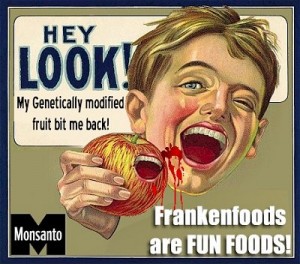One of the most important issues of our day, an issue that directly affects the health and well-being of everyone on our planet, is an issue most people have never heard about – genetically modified organisms (GMO) in our food supply. The ‘why’ is a topic we encourage everyone to research. Start here, then do some Google searches. Research both sides, then decide for your family if foods containing GMO are something you feel comfortable with your children consuming on a regular basis.
We strongly believe that removing genetically modified organisms (GMO) from our diet is one of the most important things we can do for our health. Here are a few steps our family has taken to do just that. Sure, it’s impossible to completely eliminate GMO, but we can minimize it, educate others, and fight the contamination of our food supply. Voting with our wallet is a great first step!
1.) Can the corn – One of the most widely produced and used franken-engineered crops, GMO corn is in everything from processed foods to ethanol (watch Food Inc. to see just how many products corn is used in, as well as the tactics of Monsanto and their ilk). The geniuses at Monsanto altered the DNA of corn to be resistant to pests (hey, why spray the pesticide ON the corn when you can grow it IN the corn!) as well as resistant to their herbicide, Round-UP. Who needs weeding when you can dust your entire field, corn and weeds alike, with a deadly herbicide? 
One ‘small’ detail, the fact that humans actually EAT the pesticide and herbicide laced corn that’s in almost every mainline food item they buy, is doubtless not lost on the psychopaths at the franken-engineering firms. What’s collateral damage when you can make a few extra bucks? Folks, you don’t need a pressure-canner to CAN this toxin-filled corn!
However, avoiding GMO corn isn’t easy because there are no labeling laws and, as stated before, corn is in SO many things. We found a frozen brand at Sam’s that is voluntarily advertised on the package as non-GMO. The other day we passed a farmer’s roadside stand with a sign that said ‘organic corn.’ Buy in bulk, eat a ton, freeze or can the rest. Making connections with local farmers is huge. Talk to them about GMO. Many of the smaller farmers you meet will be very aware. Don’t buy from the ones who aren’t. As always, avoiding non-organic processed foods is important. Read the labels – if it has corn syrup, high-fructose corn syrup, corn oil, corn starch, malt, maltodextrin, maltose, maltol, ethyl maltol, mannitol, malt syrup, dextrose, dextrin, polydextrose, etc., don’t buy it or at least minimize consumption of these products.
2.) Sink soy – Processed, non-fermented soy is not only GMO, but has lots of other health ramifications as well. Like corn, soy is in almost every non-organic processed food. Textured soy protein (TSP), hydrolyzed vegetable protein (HVP), textured vegetable protein (TVP), textured soy flour (TSF), lecithin, meat analogs, structured protein fiber (SPF), and soy protein concentrate are few of the GMO soy based ingredients you will find lurking in processed food. Avoiding soy isn’t quite as difficult as corn since corn is a widely used ingredient AND a vegetable most people love to eat (although some people eat soy burgers, soy milk, etc. – because of the health issues above this is not recommended). It really just comes down to avoiding non-organic processed foods.

On their website, Monsanto insists, “’There is no need for, or value in testing the safety of GM foods in humans.” Wonder why?
3.) Shake the sugar – These days more than half of non-organic white sugar isn’t from beautiful green sugar cane fields somewhere in the Caribbean, but from franken-engineered sugar beets developed in a lab somewhere by mad scientists who get high off thinking of ways to poison the food supply so farmers won’t have to weed.
The best all-around advice (although we don’t follow nearly enough!) is to avoid sugar altogether. No need to make a case here – we all know it’s not good for us. However, the Morefields like a sugar fix as much as anybody, so when we do, we like to buy organic cane sugar produced from those green sugar cane fields and sold at EarthFare. It’s a little more work to scoop it from the bin into bags, label it, and haul it home, but the peace of mind is well worth it. And, of course, sugar is in most non-organic processed foods and drinks, so avoiding those is a must as well.
4.) Replace canola oil with peanut, olive, and coconut oils – Sorry folks, no catchy phrase here, unless you can ‘crush’ canola oil. Canola oil is not only used in most households to cook, but is also found in many processed foods you find at the grocery store. Completely replacing such a major GMO product with non-GMO has lots of positive ramifications, especially for a family that cooks from scratch as much as ours. Virtually every dish has some sort of oil in it, so getting the GMO out of the oils we use, if we are careful in other areas, will get it out of lots of the dishes we cook and consume.
For everyday baking, we buy bulk peanut oil at Sam’s, refilling a smaller, handier container in our kitchen from it. It’s a little more work, but quite cost-effective. Organic virgin and extra virgin olive oils can be found at health food stores like EarthFare, Whole Foods, and Trader Joe’s, although occasionally you can find them at closeout stores like Big Lots for a fraction of their original price, and even at discount retailers like Ross and TJ Max. Note: Be careful what oil you use because not all olive oil is olive oil.
Coconut oil is harder to find, but can be found online or at health food stores. Although Trader Joe’s is probably the least expensive, coconut oil is still more expensive than the other oils. There’s a reason for that – it’s also the best for you! We can’t afford to use coconut oil for everything we cook, but if we could we probably would.
Does anyone see a pattern here? Almost all GMO ingredients can be ‘conveniently’ found all in one place, the middle aisles of mainstream grocery stores! These are the convenience items, for families that just don’t have the time to cook from scratch, ‘conveniently’ laced with potentially deadly GMO ingredients for young and old alike. When shopping at mainline grocery stores, stay on the edges and avoid the center aisles. If you must buy processed foods, it’s worth a few more dollars to buy organic. (Just be sure it’s labeled ‘USDA Organic,’ or you might not be getting what you paid for.) The Non-GMO shopping guide is a great place to start!











I greatly enjoyed finding you all through Stacy Makes Cents and enjoyed this article, too! My mother is a 3 year breast cancer survivor and we are big on getting rid of the GMO products in our food. Thank you for sharing this and offering encouragement.
Hi Erinn – thanks for the comment and encouragement! Kudos to your mom – getting rid of GMO is a definitely HUGE step to good health! 🙂
We use sunflower oil. Also no GMO and we make our own mayonnaise with it!
Good idea! 🙂
I buy coconut oil in bulk, their expeller-pressed option is a good quality oil and I use it the most as some of my family doesn’t like the taste or smell of coconut. Here is where I buy coconut oil, I want to try their palm oil shortening next.
http://tinyurl.com/d94dw55 (that is my referral link) IF you’ve never ordered from Tropical Traditions & you go through that link they will include a free book on coconut oil with your order. They have their sales & promotion codes listed on the right side of their website, occasionally they have FREE shipping, that is when I order my bucket of coconut oil 🙂
thanks for the tip!
As a mother of 3, I completely empathize with your desire to provide a healthy diet for your family. We DO need to limit the sweeteners we consume and buying locally is a GREAT practice!
However, as I am also the wife of a 6th generation corn and soybean farmer, I’m concerned with your explanation of a few things when it comes to RoundUp products. When you say “hey, why spray the pesticide ON the corn when you can grow it IN the corn!”, are you saying that the herbicide is in some way being injected into the seed? When you write “Who needs weeding when you can dust your entire field, corn and weeds alike, with a deadly herbicide?”, are you meaning that you believe the corn ear and kernels are being coated with RoundUp? In reality, the RoundUp gene is just a gene (much like the gene added to rice to create golden rice that is grown and consumed in areas where the people have a shortage of dietary vitamin A. This deficiency can kill 670,000 children under 5 each year). The RoundUp that is applied to the field corn is sprayed before the plant even has an ear developed on it.
Despite what you say about “toxin filled corn” and a “poisoned food supply”, we are blessed to have the safest and most affordable food in the world right here in the United States. And we are also blessed to be able to make the choice of what we purchase (thank God for that choice).
Hi Meg – I appreciate the comment. The toxin ‘in’ the corn I’m referring to is ‘bt corn,’ where the insecticide is actually produced by inserting genes from the bacteria “Bacillus Thuringiensis” into the corn. You can read about it here, among other places – http://foodintegritynow.org/2011/05/19/gmo-study-omg-you%E2%80%99re-eating-insecticide/ As for RoundUP, I appreciate that you don’t spray your corn before the plant has developed, but I don’t think every farmer does this. Further, there are other consequences to using RoundUP at all – http://www.biosafety-info.net/article.php?aid=267
As for choice, why are Monsanto and their ilk so opposed to GMO labeling laws? Right now the only ‘choice’ is to pay more and go to, at times, great lengths to avoid GMO, and even then it’s almost impossible to avoid it all. They don’t want ‘choice,’ they want a monopoly. Check out Food Inc. to see some of their tactics…
The food is deemed ‘safe’ because it won’t kill you tomorrow, next month, or even probably within several years – but extrapolate what happens to rats who eat it and you can surmise what could happen long term. We’re only a few years into this crazy experiment.
As a person who has grown up on a farm, and “lived in the middle of corn fields” most of my life, I can tell you most certainly that the things you spray on corn, or put in the soil WILL be absorbed by the plant, no mater what stage of growth it is in. I homeschool, and in the past year my now fifth-grade son has done some science experiments that prove this fact. I feel it is important to show kids this, because it helps them understand why it is importasnt to eat healthy, natural, organic foods. A neighboring farmer has given me a long, eye-opening “course” in the corn and pesticide/herbicide industry. It is shocking. I knew much of this from growing up as a corn farmer’s daughter. I moved into the city for many years and am back in rural Iowa now surrounded by corn again. I didn’t realize to what extent our corn is now “manipulated”. Also, this farmer told me that they are now having to use more potent chemicals in the seed corn and spray pesticides, because the pests are coming back stronger- having built immunity against what is being used. This pertains to many of the fruits and vegetables grown in this country. I always saw the problems with this, but after talking to this man, I am even more dtermined to feed my family organic food. Research this for yourselves and you may be horrified by what you find about our agriculture industry. I am not trying to scare anyone , but people deserve to know exactly what they are buying to put in their bodies.
Great first hand info! Thanks so much for sharing. Sadly, many people don’t realize what happens to their food before they buy it at the grocery store. We can only imagine that seeing it first hand would help to intensify your stand on organic, chemical-free living. Keep up the good work! Always a blessing to meet like-minded people. Thanks again for stopping by and taking the time to share!
God Bless!
i think these tips are good, as well as the rationale behind them, but calling these people “psychopaths” and “mad scientists who get high off thinking of ways to poison the food supply” is neither helpful nor necessary (it’s slander). it may be true that their businesses are irresponsible or motivated by greed, but many of them probably believe they are using their skills to make a positive difference. they actually are “geniuses,” even if their skills are being used for an unfortunate cause.
Hi Rachel – Thanks for the comment. I appreciate your point of view, but respectfully disagree. Those who alter DNA are not only committing crimes against humanity, but crimes against nature as well. Who are we to think we can mess with God’s blueprint with no consequences? The scary part is, we are only in the early stages of those consequences. Whatever their motive, they are involved in something that could end up permanently affecting the food supply of all of humanity in a negative way. I’m sure not everyone at Monsanto is a ‘psychopath,’ but it’s hard to imagine a company involved in the things they are involved in not being run by people with those tendencies. Just my opinion of course, but hard to imagine.
It’s because they are doing good with their GMOs, it’s just it’s a monopoly.
Hi Scott,
I would have to disagree with your reply to Meg regarding the spraying of Roundup after ear development in the corn. The average corn plant is 8 feet tall when it begins producing the ear. The equipment farmers use is not be able to apply Roundup when the crop is that tall. It is sprayed much earlier in the growing season thus before the ear has developed.
Also, here is just one link regarding the benefits of biotechnology in production of crops worldwide: http://www.ncga.com/uploads/useruploads/guide.pdf
This document is long, but has a lot of sound information about biotechnology (page 43 shows how long we’ve been involved in “this crazy experiment.”)
As far as using Food, Inc. as a source of factual information, we will have to agree to disagree.
Hi Doug – so you are saying that even if farmers refrain from spraying the actual corn with RoundUp (which is good), there is absolutely no way that spraying it on the plant, letting it soak IN the plant (even if the GM gene allows the plant to live), does nothing whatsoever to affect the corn or humans who consume it? What about the herbicide IN the corn seed? What about superweeds and the need for higher and more toxic doses of it as time goes by?
http://open.salon.com/blog/zumalicious/2012/04/04/zap_it_with_roundup_think_again_before_you_spray
Bacillus Thuringiensis, used in some corn, is actually a naturally occuring bacteria that kills certain pests and most common harmful pesticides are NOT made with it. Bacillus Thuringiensis is completely safe for mammals.
Hi, Im not trying to bash you guys or anything as I believe everyone has a right to there informed opinions. However Informed is the key word GMO’s such as corn or not laced with pesticides on the inside
All they do and have been doing for Thousands of years since before there were corporations is cross breeding But on a massive Laser focused Scale the same way they did dogs and cats and cows and even black people.
its pretty simple and not going to kill us or even damage us just another scare tactic in the same vein as gluten( Which is actually good for you, UNLESS you are allergic to it)
They take one strain That grows good in crappy weather and cross it with another that grows larger than most. Resulting in a Big ear of corn capable of growing anywhere.
They dont do that to poison us or anything they do it so they can try to feed us all.. Incase you guys are not aware there is simply not enough food on this planet to feed everyone as much as we need. if people didn’t do this we would all have starved .. probably before any of you were born
Hello Scott,
I disagree with your hypothesis of GMO’s being toxic and unhealthy.I have many proof since my brother is a molecular biologist, what he does is a add a gene or two that benefits the plant. For Example: in some parts of the world there is a pathogen called Huang Long Bing also know as HLB who infects citrus, this pathogen causes the plant to die in matter of weeks, You should go to a lemon field in Mexico, where you can see practically the whole plants dead. What my brother does is insert a gene of another plant, who is immune to this pathogen.
I think ignorance is what has made people afraid of GMO’s, I hope you see my point and understand scientists don’t do this for money but to feed the growing population.
PS: I’m atheist, so don’t bring the God thing to me.